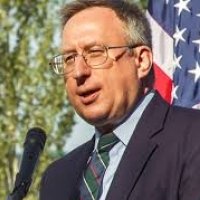Understanding Recent Turmoil in Kazakhstan: A Conversation with Amb. George Krol
In less than a week, Kazakhstan has experienced a dramatic shift in its political leadership and society. Sparked by protests on the price of gas in the country, the government has cracked down on civilian protesters, cut off internet for much of the country, and called in support from the Russian government to handle opposition. In turn, the government has resigned and former President Nursultan Nazarbayev has stepped down from his position as Chairman of the Security Council. Former U.S. Ambassador to Kazakhstan George Krol explained these dramatic shifts and what may be expected in the near future.
Key Takeaways
- Tokayev takes charge and targets the political and economic foundation of his predecessor's power.
- CSTO intervention focused on maintaining order, says Amb. Krol, and will demonstrate Russia's ability and willingness to assist allies and then leave.
- Through domestic reforms, Kazakhstan seeks to reassure international partners and investors that everything is back to business as usual.
Selected Quotes
What kind of President will Tokayev be going forward?
“Listening to him, and listening to his spokesman, and listening to some Kazakh analysts that there is a certain hope that there will be efforts undertaken to connect the government more with the people.
"What form that will take, you know, they've already had sent a governmental commission to western Kazakhstan to ‘listen,’ as it were, to the people. And Tokayev has been talking about the listening government and now will this be beyond listening and will be acting on the basis of what they're hearing—that they really are hearing what the people are saying. And this is something that Erlan Karin, who is you know very much a close advisor now to the president as he had been also with Nazarbayev as well, is intimating and what seems to be now being spread in the official media.
"Will that mean that there will be greater scope for individuals that have concerns, questions to bring them ‘into the yurt’ as it were of the state structures and the parliament and everything and make it more pluralistic in order to diffuse the tinderbox that seemed to be building up because of the stagnation of the, what was seen in some respects, as the economic and political stagnation of the Nazarbayev structure if you will and in its inability to really change how it functions.
"Now again, the question will be that President Tokayev has been a part of that structure, as have everyone else in his government, and will they be able to make cardinal changes that will satisfy many of the people of Kazakhstan who have all different kinds of—they've been unified in some respect—in their upset with the way the country has been run and governed that hasn't seemed to benefit them economically, as well as in dealing with the social needs that they have as a society.
"So it remains to be seen, but it could be that using the power that he may have, in the influence that Tokayev has, and the people that he has there, that will he be able to really press on a reform agenda that will also take into account all of the many interests that there are in Kazakhstan, including that of their neighbors to the north and also to the east?”
On the value of Kazakhstan’s relationship with Russia
“For the United States I think by tying this to the Russia equation, and Ukraine, and everything this complicates matters for the relationship with Kazakhstan because the Kazakhs are going to say that, look you know this is our partner, that Russia, the CSTO and we needed this and basically it's really none of your business to be saying things like, 'Oh you should be careful about inviting them in because they have a habit of not leaving.' Well, l they're going to show that they're leaving, and that is demonstratively I’m sure, but again the Russians at least have never left and they are their closest, most strategic and important partner that they have and they understand that the Kazakhstani government, whether it's Nazarbayev or Tokayev for whatever that is crucial to Kazakhstan to maintain that relationship with Russia. They don't like to be put in a hard place between Russia and the United States that somehow they have to choose, because at the end of the day I think we know where the choice for existential purposes has to be.”
What is the impact on China given the recent turmoil in Kazakhstan?
“Well I think that the Kazakhstani government and President Tokayev has been in very close contact with the president of China. I think very early on, the reports were that he spoke to the president of China, and whether that was the initiative of the president of Kazakhstan it may have been so, in order basically to assuage the Chinese that everything will be under control. That we don't want this mobbed or whatever to turn into an anti-China mob, which is something that has happened somewhat, the feelings of some Kazakhstanis about the Chinese and the likes, so I think that the Chinese government certainly would want to see the order and stability and trust that a government under Tokayev who actually speaks Mandarin Chinese and has a long experience of having served as a Soviet diplomat there, that he will be in control and therefore things will not spin out of control in Kazakhstan that might bring into power a ruling regime that might be more hostile to China and its economic interest there.
"Similarly, that President Tokayev would have called the Russian president, these are their two largest neighbors and they're very close to them, in order to give them a briefing on what is going on. Before the Russians or the Chinese if they don't hear anything they'll come to their own conclusions and maybe do things that the government of Kazakhstan may not wish to see because they want to be in control.
"So, it's perfectly natural, it would seem to me, that the Kazakhstani government has assured their major neighbors. They called the Uzbek’s Mirziyoyev, President Mirziyoyev, as well to assure them and whether or not they got, I don't know whether or not you know the borders of Russia, China, and Uzbekistan were closed at the request of the Kazakhstani authorities. Similarly with Kyrgyzstan as well, I don't know, I haven't seen anything to that effect, but it doesn't would not surprise me that didn't that the leadership of Kazakhstan, that is, Tokayev, would be calling to ensure and to quiet any alarms that the neighbors may have about things spinning out of control in Kazakhstan. So, I think China is glad to see order in and the order under Tokayev continue."
Can we expect to see fair Parliamentary elections in Kazakhstan?
“I’ve been hearing from some Kazakhstanis that this may be in the offing and that if President Tokayev is interested and wishes to push sort of this new Kazakhstan and the like, is that okay - the next is he has a new government, now it's a matter of the new parliament and with new faces and new people in it because there were members of that parliament that were hand-picked by, if you will, the Nazarbayev structure and will there be people, new people, brought in? Will it be opened up so that there will be voices allowed to speak in parliament that would be somewhat critical of, and actually you know will there be debates and not simply accepting the messages and the legislative agenda that's presented by the presidential administration? Will there be more debate? And will there be more influence, if you will, in the dialogue on it, even though, at the end of the day, the decisions will be made by the presidency. But will there be an effort to make the parliament into kind of a, part of the listening box that people in the parliament can speak on behalf of constituencies and the government will hear them and there will be a more active debate.
"That's possible, we shall see what ideas and if there will be new leaders in the parliament and a new way the parliament operates vis-a-vis the government and the people of Kazakhstan. But it's possible that might be part of this ‘new Kazakhstan’ that President Tokayev is speaking about.”
Speaker

Moderator

Hosted By

Kennan Institute
The Kennan Institute is the premier US center for advanced research on Eurasia and the oldest and largest regional program at the Woodrow Wilson International Center for Scholars. The Kennan Institute is committed to improving American understanding of Russia, Ukraine, Central Asia, the South Caucasus, and the surrounding region though research and exchange. Read more
